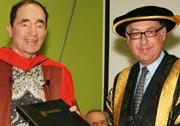Reconciling the past
Relying on due process of the law alone is not enough to heal the wounds of injustice, anti-apartheid icon and former South African judge Albie Sachs has told a UNSW audience.
Relying on due process of the law alone is not enough to heal the wounds of injustice, anti-apartheid icon and former South African judge Albie Sachs has told a UNSW audience.

Due process of the law on its own is not enough to heal the wounds of injustice, anti-apartheid icon and former South African Constitutional Court judge, Albie Sachs has told a UNSW audience.
Only a humanitarian understanding and an honest acknowledgement of past wrongs can bring about true reconciliation, he said, delivering the annual Hal Wootten Lecture at the UNSW's Faculty of Law.
The University awarded Sachs an Honorary Doctorate of Laws, its highest tribute, in a ceremony held before the lecture, named in honour of the Faculty's founding Dean.
One of South Africa's best known freedom fighters, Sachs survived a bombing attempt on his life, which cost him an arm and the sight in one eye. He went on to play a key role in drafting the country's new constitution and bill of rights and the design of the Truth and Reconciliation Commission.
In 1994, following South Africa's first multiracial elections, Sachs was one of the first judges appointed to the Constitutional Court by President Nelson Mandela.
South Africa's transition from a white supremacist regime to a constitutional democracy of one person, one vote, was a form of "soft vengeance" for the violence, Sachs said, but it was the" process of truth and reconciliation that brought about healing".
Sachs said one of the most difficult issues in the Truth and Reconciliation Commission process was the granting of amnesties to killers and torturers who came forward and admitted their culpability, because amnesties flew in the face of due process.
"I often wondered: Why did so much truth pour out in this commission when there wasn't formal due process of law? I was earning my daily bread as a judge on the assumption that due process was the foundation of the law."
Simply uncovering facts and paying compensation is not enough, Sachs said.
"For most people most of the time, the truth that matters is experiential truth. Have an experience and then interrogate it. Ask what can I learn from this? That was the main power of the Truth and Reconciliation Commission."
Sachs said Ubuntu - an African philosophy of interconnectedness and generosity - was the real force behind his country's transformation.
"To gain freedom was a much more powerful vengeance than to impose solitary confinement and torture on the people who had done these things to us," he said.
"To respond in kind to the violence of apartheid would have been wrong. It would have meant we had become like them, for a more noble cause to be sure, but in the end no different from them, only stronger."
Albie Sachs is in Sydney as a guest of UNSW's Australian Human Rights Centre.
Read Centre director Andrea Durbach's opinion piece.
Read the story on smh.com.au
Contact: Steve Offner, UNSW Media Office |02 9385 8107|